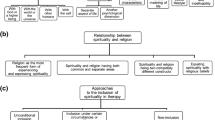Abstract
This study aimed to examine the effects of advice from religious/spiritual leaders and friends/family of a religious/spiritual person with mental health struggles on treatment-seeking. A survey was administered to adult patients of a university-affiliated psychiatric clinic in the Midwest. Participants whose friends/family members’ advice conflicted with their psychiatrist’s advice were six times more likely to delay seeking mental health treatment (OR: 6.09, 95% CI: 1.37, 27.01). Conflict between religious/spiritual leader’s advice and psychiatrist’s advice had a significant effect on delay in seeking mental health treatment (OR: 11.73, 95% CI: 2.21, 62.14), with an average delay of just over two years.
Similar content being viewed by others
References
Abu-Raiya, H., Pargament, K. I., & Krause, N. (2015). Religion as problem, religion as solution: Religious buffers of the links between religious/spiritual struggles and well-being/mental health. Quality of Life Research, 25(5), 1265–1274. https://doi.org/10.1007/s11136-015-1163-8.
American Psychiatric Association. (2013). Diagnostic and statistical manual of mental disorders (DSM-5®). Arlington: American Psychiatric Publishing.
Bergen, J., Hunt, G., Armitage, P., & Bashir, M. (1998). Six-month outcome following a relapse of schizophrenia. Australian and New Zealand Journal of Psychiatry, 32(6), 815–822.
Bordenave-Gabriel, C., Giraud-Baro, E., De, I. B., Bougerol, T., & Calop, J. (2003). Why psychotic patients are not drug compliant? L’Encephale, 29(3 Pt 1), 213–222.
Bonelli, R. M., & Koenig, H. G. (2013). Mental disorders, religion and spirituality 1990 to 2010: A systematic evidence-based review. Journal of Religion and Health, 52(2), 657–673.
Galanter, M., Dermatis, H., Talbot, N., McMahon, C., & Alexander, M. J. (2011). Introducing spirituality into psychiatric care. Journal of religion and health, 50(1), 81–91. https://doi.org/10.1007/s10943-009-9282-6.
Gearing, R. E., & Mian, I. A. (2005). An approach to maximizing treatment adherence of children and adolescents with psychotic disorders and major mood disorders. The Canadian Child and Adolescent Psychiatry Review, 14(4), 106.
Harris, K. M., Edlund, M. J., & Larson, S. L. (2006). Religious involvement and the use of mental health care. Health Services Research, 41(2), 395–410. https://doi.org/10.1111/j.1475-6773.2006.00500.x.
Hill, P. C., & Pargament, K. I. (2003). Advances in the conceptualization and measurement of religion and spirituality: Implications for physical and mental health research. American Psychologist, 58(1), 64–74.
Koenig, H. G. (2015). Religion, spirituality, and health: a review and update. Advances in Mind-Body Medicine, 29(3), 19–26.
Koenig, H. G., Hover, M., Bearon, L. B., & Travis, J. L., III. (1991). Religious perspectives of doctors, nurses, patients, and families. Journal of Pastoral Care, 45(3), 254–267.
Kohn, R., Saxena, S., Levav, I., & Saraceno, B. (2004). The treatment gap in mental health care. Bulletin of the World health Organization, 82, 858–866.
Lilja, A., Demarinis, V., Lehti, A., & Forssén, A. (2016). Experiences and explanations of mental ill health in a group of devout Christians from the ethnic majority population in secular Sweden: A qualitative study. British Medical Journal Open, 6(10), 1–9. https://doi.org/10.1136/bmjopen-2016-011647.
Mitchell, L., & Romans, S. (2003). Spiritual beliefs in bipolar affective disorder: Their relevance for illness management. Journal of Affective Disorders, 75(3), 247–257. https://doi.org/10.1016/s0165-0327(02)00055-1.
Moss, Q., Fleck, D., & Strakowski, S. (2006). The influence of religious affiliation on time to first treatment and hospitalization. Schizophrenia Research, 84(2–3), 421–426. https://doi.org/10.1016/j.schres.2006.02.002.
Olfson, M., Mechanic, D., Boyer, C. A., & Hansell, S. (1998). Linking inpatients with schizophrenia to outpatient care. Psychiatric Services, 49(7), 911–917.
Pargament, K. I. (1988). Religion and the problem-solving process: Three styles of coping. Journal for the Scientific Study of Religion, 27(1), 90–104. Retrieved from https://search.ebscohost.com/login.aspx?direct=true&db=rfh&AN=ATLA0000800389&site=ehost-live
Pargament, K. I., Zinnbauer, B. J., Scott, A. B., Butter, E. M., Zerowin, J., & Stanik, P. (1998). Red flags and religious coping: Identifying some religious warning signs among people in crisis. Journal of Clinical Psychology, 54(1), 77–89. https://doi.org/10.1002/(sici)1097-4679(199801)54:13.0.co;2-r.
Patel, V., Chisholm, D., Parikh, R., Charlson, F. J., Degenhardt, L., Dua, T., et al. (2016). Addressing the burden of mental, neurological, and substance use disorders: Key messages from disease control priorities. The Lancet, 387(10028), 1672–1685.
Stanford, M. S. (2007). Demon or disorder: A survey of attitudes toward mental illness in the Christian church. Mental Health, Religion & Culture, 10(5), 445–449. https://doi.org/10.1080/13674670600903049.
Touchet, B., Youman, K., Pierce, A., & Yates, W. (2012). The Impact of Spirituality on Psychiatric Treatment Adherence. Journal of Spirituality in Mental Health, 14(4), 259–267. https://doi.org/10.1080/19349637.2012.730468.
Wang, P. S., Angermeyer, M., Borges, G., Bruffaerts, R., Chiu, W. T., De Girolamo, G., et al. (2007). Delay and failure in treatment seeking after first onset of mental disorders in the World Health Organization’s World Mental Health Survey Initiative. World psychiatry, 6(3), 177.
Acknowledgements
The authors would like to acknowledge Kathy Kyler for her editing services and Nasir Mushtaq for his statistical analysis consultation.
Author information
Authors and Affiliations
Corresponding author
Ethics declarations
Conflict of Interest
The authors declare that they have no conflict of interest to report, financial or otherwise.
Ethical Approval
This manuscript has not been published elsewhere and has not been simultaneously submitted for publication elsewhere.
Additional information
Publisher's Note
Springer Nature remains neutral with regard to jurisdictional claims in published maps and institutional affiliations.
Rights and permissions
About this article
Cite this article
Shadid, O., McIntosh, H.C., Kezbers, K. et al. Conflicting Advice between Spiritual Leaders, Friends and Family, and Mental Health Providers: Impacts on Mental Health Treatment-Seeking Behaviors. J Relig Health 60, 2608–2619 (2021). https://doi.org/10.1007/s10943-020-01132-2
Accepted:
Published:
Issue Date:
DOI: https://doi.org/10.1007/s10943-020-01132-2



